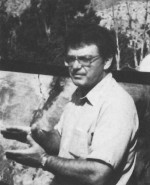Applying ecological science to society’s environmental problems
James Gosz, Executive Director
The Ecological Society of America’s Sustainable Biosphere Initiative (SBI) calls for the application of ecological science to societal problems. To develop activities that further the SBI agenda, the Project Office was established in Washington, D.C. in January 1992 through a grant from the National Science Foundation (NSF), with additional support from the National Aeronautic and Space Administration, the Environmental Protection Agency (EPA), the USDA Forest Service, and the U.S. Fish and Wildlife Service.
Project Office Staff & Activities
The combined education and experience of the Project Office staff complement the integrative, cross-disciplinary aims of the SBI. Program Assistant Stephanie Cirillo holds a degree in resource management and has experience in project development and coordination in the environmental field. Dr. Richard (Rick) Haeuber, Associate Director, received his PhD in public policy. His research and career experience have focused on environmental policy.
The Project Office has already evolved into an effective communication and coordination center. Meeting the many requests for SBI representation in various forums in the past few months, staff have attended conferences sponsored by the United Nations, the Forest Service, NSF, EPA, and other scientific associations and societies concerned with ecological sustainability issues. Meetings with representatives of other federal agencies have led to the incorporation of the SBI into their environmental and scientific agendas.
The SBI Implementation Plan
With the broad applicability of the SBI—from the microbial to the global, the individual to the societal—Project staff created an implementation plan to focus their efforts. The SBI Implementation Plan has three primary objectives:
- To communicate with scientific communities, agencies, national and international programs, and industries
- To identify new scientific issues, research and information needed for current and future research programs
- To catalyze development of new concepts through workshops, symposia, position papers and publications
Components of the Plan are purposely interrelated to ensure development of activities that include more than one component. Staff are incorporating research priorities of biodiversity, global change and sustainable ecosystems into projects that foster collaboration between ecologists and educators, other researchers, and environmental decisionmakers. An early result of the Plan has been a collaborative effort between the SBI Office and individual scientists in developing concept papers on important topics that are expected to lead to workshops and funded research programs. Topics include: the role of cumulative effects of management on biodiversity and ecological processes, characteristics and dynamics of transition zones, status of biodiversity inventories and information networks, the role of restoration in sustainability, and new perspectives on change in ecological planning.
The Plan is also providing direction for the Intellectual Frontiers Project being developed by the ESA with the SBI Project Office, and the EPA with the Future Studies Group. This Project will identify structural and organizational learning barriers to cross-disciplinary knowledge and approaches receiving adequate consideration in research and policymaking institutions. The Office will first promote peer-generated research through a series of collaborative workshops, and then prompt new interdisciplinary concepts, research and projects through communication with scientific communities, agencies, and policymakers. It is also working with educational societies, such as the Association of American Colleges, to produce in-house general educational materials on sustain- ability and the SBI.
The SBI Project Office seeks the participation of individual scientists in its projects and activities. Comments and queries are welcomed, as are visits to the Office at 2010 Massachusetts Avenue NW, Suite 420, Washington, D.C., 202-833-8748.

 Enlarge this image
Enlarge this image